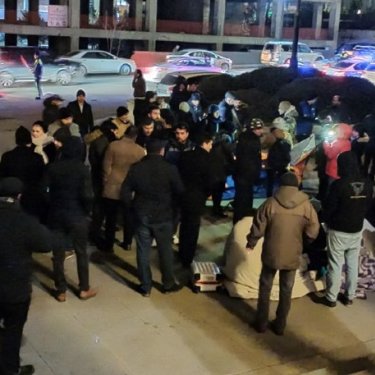Azerbaijani reporters harassed, attacked while trying to cover electoral fraud

Reporters Without Borders (RSF) is aware of at least 18 cases of journalists being obstructed and sometimes physically attacked in the course of their reporting in Baku since Azerbaijan’s snap parliamentary elections on 9 February, which were marred by fraud. The authorities must prosecute those responsible for the violence, RSF said.
When a sit-in by opposition candidates outside the Central Electoral Commission in Baku was violently dispersed by special forces amid mounting tension on the night of 11 February, some journalists were able to flee but around seven were arrested and beaten.
“I was bundled into a car in which three policemen kept punching me and kicking me,” Basta.info news website editor Mustafa Hajibeyli said in a Facebook post. “My face was covered in blood.” He was released but was told to report to the police yesterday.
As the demonstrators were being taken away in a bus, six women journalists who had been covering the event were beaten by police, sustaining injuries, and their cameras were confiscated.
Meydan TV reporter Sevinj Vagifgizi suffered a serious hand injury and bruising to her face. Voice of America journalists Ulviyya Guliyeva and Aygun Rashidova, the correspondent of Radio Azadlig (Radio Free Europe/Radio Liberty’s Azeri-language service), Aytan Mammadova, and two freelancers, Aynur Elgunesh (who was hit on the head) and Aytaj Taptyg, were also driven around the outskirts of the city for about two hours and then released far from the main highway.
Three fellow journalists, including the well-known investigative reporter Khadija Ismayilova, who managed to follow them in a taxi, also ended up being arrested and beaten.
“The Azerbaijani authorities continue to suppress all forms of pluralism, both political and journalistic, in violation of their international obligations and their promises to guarantee media freedom and security,” said Jeanne Cavelier, the head of RSF’s Eastern Europe and Central Asia desk.
“Not only were the independent media unable to cover the flagrant violations of electoral regulations but journalists were also the victims of unacceptable police violence. We call for a transparent investigation, the prosecution of those responsible for this violence, and respect for the European Convention on Human Rights and the International Covenant on Civil and Political Rights.”
Earlier in the day on 11 February, police harassed several journalists during a press conference by a group of candidates outside a polling station and even beat cameramen from Radio Azadlig and the Toplum TV website, among others.
On the day of the elections, RSF registered at least eight cases of journalists being attacked or prevented from working. Radio Azadlig – one of whose journalists, Islam Shikhali, was subjected to harassment – posted a video of acts of aggression against journalists and electoral observers. Another video showed several persons trying to prevent local BBC correspondent Aygun Mehman from filming. A member of the electoral commission broke Yeni Cumhurriyet website reporter Ali Safar’s camera.
Freelancer Fatima Movlamli filmed herself to tell about her harassement outside a Baku polling station and post it on Facebook. Aziz Karimov, a reporter for the independent news agency Turan, and his cameraman, Farid Gahramanov, were pressured not to film, as were Voice of America local correspondent Parvana Bayramova and Yulvi Hasanli, the editor of the Abzas.net news site.
The ruling New Azerbaijan Party unsurprisingly managed to win most of the parliamentary seats, according to the provisional results. The Organization for Security and Cooperation in Europe, the European Union, the United States and others have denounced flagrant irregularities. Opposition parties and independent candidates have called for a protest on 16 February. Some candidates boycotted the elections in protest against their ostracism by the state-controlled media.
Opposition media and websites, including the online newspapers Basta.info and Yuksalish Namina, were blocked or were the victims of cyber-attacks before the elections.
Azerbaijan is ranked 166th out of 180 countries in RSF’s 2019 World Press Freedom Index. The leading critical media outlets have been silenced or have had to relocate abroad, the main independent websites are blocked and at least six journalists are currently in prison.



